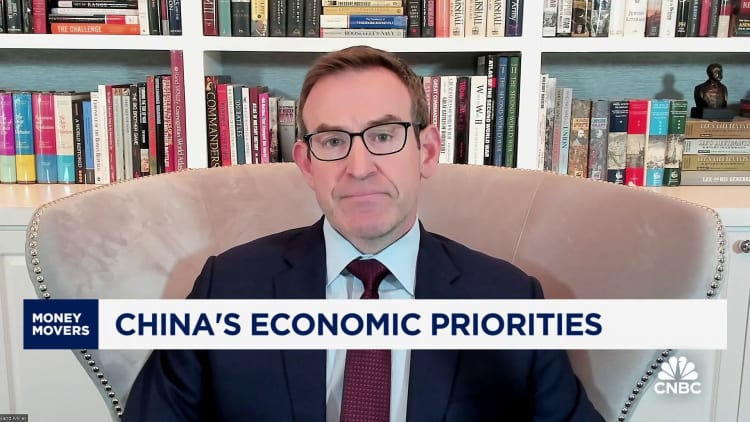Chinese Foreign Minister Wang Yi in 2019.
Mark Kauzlarich | Reuters
BEIJING — China’s top diplomat slammed the U.S. for worsening bilateral tensions, while reiterating Beijing’s support for peaceful resolutions to the Israel-Palestine and Russia-Ukraine conflicts.
“There is some progress in the China-U.S. bilateral relationship, but we have to point out that U.S. continues to persist with a wrong understanding of China and it has not fulfilled the promises it has made,” Foreign Minister Wang Yi told reporters at a briefing on Thursday, according to a CNBC translation of his comments in Mandarin.
Wang’s comments came as the U.S. Senate’s homeland security committee voted Wednesday to move a bill that could limit U.S. market access for Chinese biotech firms. A member of President Joe Biden’s administration also warned Wednesday that China could flood the U.S. electric-vehicle market with low-cost offerings.
Biden has also doubled down on restricting Beijing’s access to advanced semiconductor technology, putting a strain on U.S.-China relations that were expected to improve after President Joe Biden and President Xi Jinping met in San Francisco in November.

Relations between the world’s two largest economies have been characterized by their competing interests, and opposing geopolitical positions on the Middle East and Ukraine conflicts as well as the South China Sea.
Wang said the U.S. has been devising “new ways to suppress China,” saying U.S. accusations against China had reached an “unbelievable degree.” While he said he sees a way forward for both countries, Wang said communication between both countries may only continue by respecting and recognizing differences.
“The U.S. says one thing but does another, where is the trust for large countries?” said Wang, speaking on the sidelines of the country’s annual parliamentary meetings.
“If it persistently monopolizes the high end of the value chain, and keeps China at the low end, where is fairness and competition?” he added.
China’s top economic objective this year is to “modernize the industrial system and developing new quality productive forces at a faster pace” — underscoring the heavy emphasis on strengthening Beijing’s industrial prowess as a longer-term growth driver.
Global conflicts
Wang is also director of the office for foreign affairs within the Communist Party of China’s central commission, making him the country’s most senior diplomat.
After the unexplained dismissal of Qin Gang as foreign minister in July last year, Wang reassumed the role. Qin had presided over the foreign minister’s press conference at last year’s parliamentary meeting, but disappeared from public view within months and hasn’t been seen since.
Prior to reassuming the position, Wang held the foreign minister role for two terms. He has been involved with high-level U.S.-China meetings for more than a decade.
Wang did not take any questions on Qin’s disappearance at his press briefing.
In his press briefing though, Wang also called for a peaceful resolutions to the Israel-Palestine conflict and Russia’s invasion of Ukraine.
He repeated China’s calls for the resumption of Israel-Gaza peace talks and the release of all detainees, while reiterating Beijing’s support for Palestine’s full United Nations membership.
“Palestine has a right to exist in this world … all detainees should be released and all acts of killing should stop,” Wang said. “China fully supports Palestine becoming a full member of the United Nations.”
On the Russia-Ukraine crisis, Wang said misunderstandings and misjudgments will multiply without peace talks. He said Beijing supports a fair discussion or a solution for peace that is recognized by both sides. Russia is one of President Xi’s most reliable global ally.
China is willing to work with other countries to promote multi-polar economic globalization, Wang said.
Taiwan and the South China Sea
On Taiwan, Wang said it’s inevitable that the self-governing island will “peacefully reunite” with the mainland — using the phrase that was dropped from this year’s China government work report.
Wang said those who support Taiwan’s independence will be “burned down to the bones.”
Taiwan’s ruling Democratic Progressive Party won an unprecedented third-straight presidential term at elections in January, as incoming leader Lai Ching-te pledged to stay open-minded about his approach toward governance, while committing to forging consensus in a split legislature.

Wang also pledged to work with Southeast Asian nations to make the South China Sea “a sea of peace and cooperation.”
His comments come after yet another clash between Chinese coast guard vessels and those from the Philippines on resupply missions to troops stationed on an old warship that Manila grounded at the Second Thomas Shoal more than a decade ago to stake its sovereignty claims in the South China Sea.
Top officials from Australia and other Southeast Asian countries gathered in Melbourne for the inaugural Australia-ASEAN summit have urged restraint on all sides.
The Permanent Court of Arbitration at The Hague ruled in 2016 that China’s claims over vast portions of the South China Sea have no basis in international law — a ruling that Beijing has rejected.
Beijing has also taken offence at joint exercises and patrols that U.S. and other Western naval powers have conducted with various Asian nations in international waters that Beijing claims as its own.
On Thursday, Wang repeated a warning for “some countries outside the region” to “not stir trouble and take sides” in the South China Sea.

